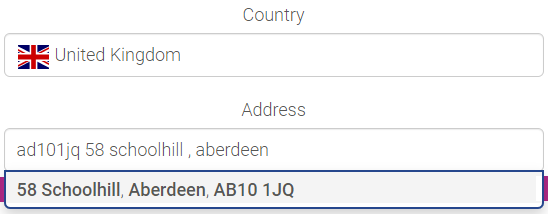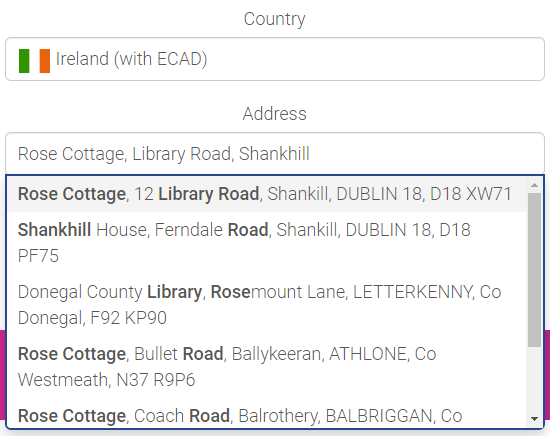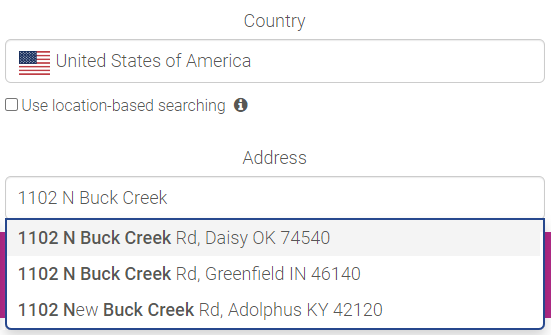Pro API is a suite of functions that you integrate into your own applications. Once successfully integrated, Pro takes partial or full address information that you type in and returns a complete, validated address.
Fuzzy matching is the process of intelligently searching for an address, approximately matching the address information provided by the user to addresses in the authoritative reference dataset (i.e. from Royal Mail, USPS, Australia Post), and returning all likely possibilities for the user to select from. This is useful when the user provides too little or too much information, inputs the address in the wrong format or includes a typo.
Pro API leverages advanced fuzzy matching logic to deliver the most approximate search results for the user to select from, based on a degree of confidence, rather than an exact match. The solution intelligently recognizes and works around the errors below, reformats the address if needed and includes missing elements to deliver a correct, complete, and formatted address.
Abbreviations – users enter abbreviations for certain address components. For example, Av for Avenue, Blvd for Boulevard, Rd for Road as well as Ch for Chemin (French) or Str for Straße (German).
Typos – users make errors in data entry, especially when on mobile devices or spelling addresses phonetically. For example, entering an 'n' instead of an 'm' or entering 'streeet' instead of 'street'.
Incorrect ordering or format – users don't always enter the address in the way it appears on an envelope. For example, enter the town or city first, followed by the street and building number.
Missing or additional spaces – users add or miss spaces between words or even within words without realizing.
Missing or additional information – users provide too little or too many address elements when searching for an address. For example, leave out the property/building number.
If the address input cannot be matched to any likely address, a "No matches" message will be shown to the user. Below is an example of fuzzy matching in practice, whereby the user has made an error in data entry and the sophisticated algorithms recognize this and return the relevant address.
| Category | Example |
|---|---|
Formatting errorsOur service correctly classifies and rearranges components to find the intended address. |
 |
Too little informationOur service correctly determines the building number and the postal code. |
 |
Non-standard abbreviationsOur service provides recommendations for both "North Buck Creek" and "New Buck Creek". |
 |
Users can use wildcards to replace one or more missing letters in their address information. There are two wildcards available. Users can use a combination of wildcards in a single search line.
Question mark wildcard (?)
This wildcard replaces a single character in an address or postcode.
Cannot be used
Asterisk wildcard (*)
This wildcard replaces any number of characters at the end of an address element.
If too many wildcards are used in a search, there is a risk of a considerably extended searching time, and possibly no returned matches. To prevent this from having an adverse effect on the server, a timeout is provided and also a limit on the number of returned searches.
Question Mark Wildcard
When users search with a question mark wildcard, Pro API produces a list of all matching streets and postcodes. For example:
| Action | Pro API retrieves… |
|---|---|
| Select the USA dataset and enter ?146? | A list of all US cities with ZIP Codes beginning 114, 214, 314 etc. Similarly, all ZIP Codes ending with 461, 462 and so on. |
| Select the AUS dataset and enter 13 Clarke St, 3?67 | Two addresses at "13 Clarke Street, Abbotsford, VIC 3067" (Two bordering locality matches in Richmond are also returned.) |
Users can use the question mark wildcard on any type of address element, including postcodes, street names, towns and localities.
Asterisk Wildcard
This wildcard replaces any number of characters at the end of an address element. For example:
| Action | Pro API retrieves… |
|---|---|
| Select the USA dataset and enter Rose *, New Orleans | Any address starting with "Rose" in New Orleans, including Rosecrest Ln, Rosedale Dr, etc. |
| Select the USA dataset and enter Highland Ave, Trent/* | Streets called "Highland Ave" in places beginning with "Trent". This could include Trenton, Trentwoods, etc. |
Both Wildcards Combined
Users can combine * and ? wildcards in one search.
| Action | Pro API retrieves… |
|---|---|
| Select the UK dataset and enter 33 back*, cb?4?a | The full address: "33 Back Hill, Ely, Cambridgeshire, CB7 4DA". |
| Select the UK dataset and enter oak house, threemile, tr?6G/ | The full address: "Oak House, Threemilestone, Truro, Cornwall, TR3 6GU". |
There are certain types of picklist item that must be treated as special cases in Typedown and Single Line searches. These are:
An unresolvable range is a picklist item that represents a range of premises, but where there is not enough information within the data to resolve the entry into a list of premises.
These are very common when searching against the USA data, although they also exist within other data and must be handled appropriately.
For example, search using Single Line against the USA data using the optimal prompt set with the address:
Street Address: Arch St
Zip Code: 02110-14ND
This returns a page containing a text box that prompts the user to enter a premises within the following range:
2...78 Arch St, Bostom MA [even]
This is an unresolvable range meaning that there is no available data to determine which possible even values between 2 and 78 are valid, and which are invalid. The user therefore has to specify the premises number that will resolve this picklist item, so that a single address can be generated from the range.
A Phantom Primary Point (PPP) is specific to AUS data. A phantom primary point is a premises which is non-deliverable unless the user enters further secondary information. This secondary information may or may not be in the actual data. The user must enter this sub-premises information in order to complete a final address match.
For example, search using Single Line against the AUS data using the optimal prompt set with the address:
Building number or PO Box: 44
Street: Miller St
Postcode: 2060
This returns a picklist where the first entry is:
44 Miller Street, NORTH SYDNEY NSW
This is marked as a PPP, which means that if this picklist item is selected, the integration must prompt the user for additional sub-premises information.
An incomplete address is an address that is not deliverable due to missing premises information within the data. This therefore requires the user to provide additional premises information within the data. This therefore requires the user to provide additional premises information so that the address is deliverable. Incomplete addresses are found in various datasets, such as the DEU data.
For example, search using Single Line against the DEU data using the optimal prompt set with the address:
Street: Feldburg
Building number or name:
Postcode: 50181
This returns a picklist with the following single entry:
Feldburg, BEDBURG 50181
This is marked as an incomplete address, which means that if this picklist item is selected, the integration must prompt the user for additional sub-premises information.
The following steps should be taken when a picklist item is flagged as an unresolvable range, Phantom Primary Point or incomplete address:
FullAddress flag/property.This flag can be used to format the address.